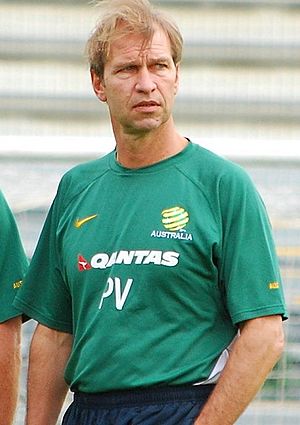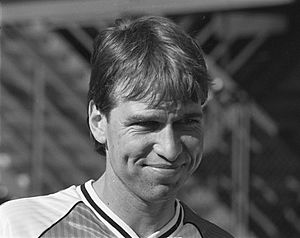Pim Verbeek facts for kids

Verbeek as Australia's head coach in September 2008
|
||||||||||||||||
| Personal information | ||||||||||||||||
|---|---|---|---|---|---|---|---|---|---|---|---|---|---|---|---|---|
| Full name | Peter Tim Dirk Verbeek | |||||||||||||||
| Date of birth | 12 March 1956 | |||||||||||||||
| Place of birth | Rotterdam, Netherlands | |||||||||||||||
| Date of death | 28 November 2019 (aged 63) | |||||||||||||||
| Place of death | Amsterdam, Netherlands | |||||||||||||||
| Position(s) | Defender, midfielder | |||||||||||||||
| Senior career* | ||||||||||||||||
| Years | Team | Apps | (Gls) | |||||||||||||
| 1974–1975 | Sparta Rotterdam | |||||||||||||||
| 1977–1980 | Sparta Rotterdam | |||||||||||||||
| Managerial career | ||||||||||||||||
| 1981–1984 | DS '79 | |||||||||||||||
| 1984–1987 | Unitas Gorinchem | |||||||||||||||
| 1987–1989 | De Graafschap | |||||||||||||||
| 1989 | Feyenoord | |||||||||||||||
| 1991–1992 | Wageningen | |||||||||||||||
| 1992–1993 | Groningen | |||||||||||||||
| 1994–1997 | Fortuna Sittard | |||||||||||||||
| Omiya Ardija | ||||||||||||||||
| 2001–2002 | South Korea (assistant) | |||||||||||||||
| 2002–2003 | Jong PSV | |||||||||||||||
| 2003 | Kyoto Purple Sanga | |||||||||||||||
| 2004 | Netherlands Antilles | |||||||||||||||
| 2004 | Borussia Mönchengladbach (assistant) | |||||||||||||||
| 2005 | United Arab Emirates (assistant) | |||||||||||||||
| 2005–2006 | South Korea U-23 | |||||||||||||||
| 2005–2006 | South Korea (assistant) | |||||||||||||||
| 2006–2007 | South Korea | |||||||||||||||
| 2007–2010 | Australia | |||||||||||||||
| 2010–2014 | Morocco U-23 | |||||||||||||||
| 2016–2019 | Oman | |||||||||||||||
|
Medal record
|
||||||||||||||||
| *Club domestic league appearances and goals | ||||||||||||||||
Peter Tim Dirk "Pim" Verbeek was a famous Dutch football coach. He was born on March 12, 1956, and passed away on November 28, 2019. He coached many teams around the world. His last job was coaching the Oman national football team.
Contents
Playing Career
Pim Verbeek played football as a defender or a midfielder. He spent his entire playing career at Sparta Rotterdam in the Netherlands. He played for them in two different periods: from 1974 to 1975 and again from 1977 to 1980.
Managerial Career
Pim Verbeek had a long and successful career as a football manager. He coached many different clubs and national teams. He was known for helping teams improve and achieve new successes.
Coaching South Korea
Verbeek worked as an assistant coach for the South Korea national football team. He helped them at the 2002 FIFA World Cup and the 2006 FIFA World Cup. Before this, he coached several teams in his home country, the Netherlands. These included De Graafschap, Groningen, and Fortuna Sittard. He even coached Feyenoord for a short time.
In 2006, Verbeek became the head coach of South Korea. He led them to a third-place finish at the 2007 AFC Asian Cup. This result meant they automatically qualified for the next tournament. He left the team in July 2007.
Coaching Australia
After leaving South Korea, Verbeek became the coach of the Australian national team. This was announced on December 6, 2007. In his first World Cup qualifying match, he led Australia to a 3-0 win against Qatar.
Verbeek was very honest about the quality of football in Australia's local league, the A-League. He sometimes said that some local players were not performing well enough. He also questioned why some Australian players left big European clubs to play back home.
Under Verbeek, Australia became one of the first countries to qualify for the 2010 FIFA World Cup. They secured their spot after a 0-0 draw against Qatar in June 2009.
At the 2010 World Cup, Australia lost their first match 0-4 to Germany. Verbeek was criticized for not starting with enough attacking players. Australia then drew 1-1 with Ghana and won 2-1 against Serbia. They finished third in their group and were eliminated from the tournament. Verbeek left the team shortly after.
Coaching Morocco's Youth Teams
On April 8, 2010, Verbeek took on a new role in Morocco. He became the technical director for Morocco's youth football teams. His main job was to find and develop young talented players. He wanted to prepare them for the Moroccan national team.
He helped create a strong new generation of Moroccan players. His U-23 team finished second at the 2011 CAF U-23 Championship. This success helped Morocco qualify for the 2012 Summer Olympics.
Even though Morocco's team did not advance far in the Olympics, many of their young players became well-known. Players like Nordin Amrabat and Yassine Bounou later played for Morocco in the 2018 FIFA World Cup. Many players he helped develop formed the core of the Moroccan team that reached the semi-finals of the 2022 FIFA World Cup. This was a historic achievement for an African team. Verbeek left Morocco after the Olympics.
Coaching Oman
In 2016, Verbeek was appointed as the coach of the Oman national football team. Under his leadership, many new talented players joined the team. Oman went on to win the 23rd Arabian Gulf Cup in Kuwait. This was Oman's second-ever Gulf Cup title and Verbeek's first international trophy as a head coach.
His biggest success came at the 2019 AFC Asian Cup. Oman lost to Uzbekistan and Japan by small margins. However, they defeated Turkmenistan 3-1. This win helped Oman reach the knockout stages of the Asian Cup for the very first time. It was a huge moment for Omani football history. After Oman lost 2-0 to Iran in the round of 16, Verbeek announced his retirement from coaching.
Return to Sparta Rotterdam
On February 12, 2019, Sparta Rotterdam announced that Pim Verbeek would join their club's board. He held this position until he passed away.
Managerial Style
Pim Verbeek often used two defensive midfielders in his teams. He usually played with one main striker. His teams were known for playing carefully and building up their attacks slowly. They often relied on crosses and team passes to create chances.
Personal Life and Death
Pim Verbeek's brother, Robert, is also a football coach. Pim Verbeek passed away on November 28, 2019, at the age of 63. He had been battling cancer for four years.
See also
 In Spanish: Pim Verbeek para niños
In Spanish: Pim Verbeek para niños
 | Audre Lorde |
 | John Berry Meachum |
 | Ferdinand Lee Barnett |


